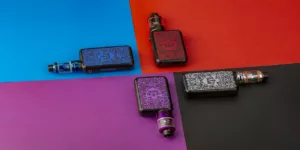Over the past few years, vaping has become an increasingly popular alternative to tobacco products. There have been quite a significant number of reasons behind this, with many people pointing to fewer negative health consequences compared to tobacco.
Alongside this, there have been a variety of flavored vapes available for several years. While this has been seen as a positive benefit by some who have switched over from tobacco, it’s also seen as a negative.
The main reason for this is that an increasing number of teens have reportedly been attracted to these flavors. As such, this has led to the rise of vaping among youth, many of whom may not be legally old enough to purchase vaping devices and other tobacco products.
According to some reports, more than a quarter of high school students in the United States are regular vapers. This is much more than many people may have expected.
As a result, the vaping industry has received a significant amount of criticism. Many critics have suggested that many vape companies could be intentionally marketing their products to teenagers. At best, critics claim that these firms are being negligent with their marketing and sales.
However, this hasn’t been the only critiques that have been leveled at the industry in the past few months. In contrast, as the niche has grown, so too has the criticism of it, leading to many people assuming that a war on vaping has begun.
While this has started to run in tandem with the war on tobacco, there have been efforts that lead many to assume that the war on vaping is a separate entity. Despite this, many people have noted that there are quite a large number of parallels between both.
Drug Use
Quite a significant number of products have been taken in by the black market in recent centuries, with tobacco being one of the more profitable. This is something that has begun affecting the vaping industry, although it has many more repercussions than many people may have initially thought.
This can be highlighted by Utah, which is reportedly seeing an increasingly prominent trend in the past few years. According to the DEA and other agencies, more and more vaping cartridges are being filled with THC and other illicit substances, with three people recently being arrested for distributing thousands of them.
Speaking about their use, DEA District Agent in Charge Brian Besser has noted that the use of these illegal cartridges has become increasingly more prominent. He has also suggested that drug cartels are starting to take note and act on the niche. The main reason for this is that Besser notes that it’s an anonymous way to buy, sell, and distribute certain drugs.
This has also had a variety of health implications, with one teen recently being hospitalized after inhaling highly-concentrated THC from a vape pen. However, this isn’t the only drug that’s been placed in the cartridges. Some reports suggest that they can also include:
- Meth
- Opiate
- Spice
As a result, it’s been claimed that many of these vaping cartridges could be much more dangerous than typical consumers would assume.
Health Impact
Since vaping products have been released, many people have claimed that they’re much healthier than typical tobacco products. This can best be highlighted by vaping company JUUL’s ‘Make the Switch’ campaign, which not-so-indirectly suggests that vaping is a healthy alternative to smoking.
However, no such claims have been proven to be true, which has embedded JUUL and a variety of other companies in controversy. Alongside this, there have been a variety of health officials who have claimed that vaping could be just as damaging to a person’s health than typical tobacco products.
War On Vaping
There has been a significant amount of legislation focused on the niche in recent months, with the war on vaping seemingly becoming President Donald Trump’s war on drugs. There have been several efforts made to curb the use of vaping products, including the announcement of a potential ban on flavored e-cigarettes.
However, a few states have gone much farther and implemented a ban on all vaping products. Despite this, many have excluded tobacco-flavored products from these bans, which many observers have criticized. In Massachusetts, though, vaping products have been banned entirely for four months.
The short timeframe, as the state governor suggests, should give scientists and medical experts enough time to determine what is making people sick. It’s also been claimed that this should then help inform future laws regulating the niche.
While the majority of injuries and deaths linked to vaping have been because of THC and other additives, it doesn’t rule out other potential effects. However, quite a large number of experts have suggested that the four-month timeframe in Massachusetts isn’t long enough to make accurate claims.
This is especially true when it comes to cancer links, among others. Despite this, quite a large number of states are becoming proactive in trying to reduce the amount of vaping products on the market. There have been several states and cities in particular that have done so, including:
- New York, which has placed a state-wide ban on the sale of flavored e-cigarettes;
- Michigan, which became the first state to ban flavored e-cigarette sales;
- Rhode Island, which has also banned the sale of the products.
While California hasn’t banned vaping products, a significant number of health officials have warned vapers to stop using them immediately.
Throughout this time, there have also been a variety of non-profit efforts to try to tackle potential drug use, regardless of whether it’s done through vaping.
Many of these are educational in nature and encourage young people to attend college, such as the Rusty Tweed Drug Free Scholarship, who is run by product support of Drug Free World – Rusty Tweed.
Potential Outcomes
As the war on vaping continues to build up a head of steam, there are relatively few possible outcomes. If many reports are to be believed, then the United States could end up banning vape products entirely, as several states have already done.
Should this occur, however, this shouldn’t be the end of the vaping industry. In contrast, it could lead to the black market and make it much larger than it already is. This could subsequently worsen the potential health implications that the legal vaping industry has already been criticized for.
Many believe that in a best-case scenario if they’re banned, high-quality vaping products will be illegally imported and sold on the black market. However, things rarely go according to the best-case scenario. This has led to speculation about what could happen, with much of this being based on activities that are already taking place.
One of the most notable of these is that drug cartels could expand their presence in the niche. As highlighted above, this might not turn out well. Similar to the prohibition on alcohol in the early 1900s, banning vaping products could lead to quite a substantial illicit market.
Just like that, this could mean that high-quality products will be mixed with chemicals and ingredients that may have a harmful impact on a person’s health. This is an outcome that many governments and vaping companies would like to avoid.
Alternatively, there is another potential outcome in the war on vaping; increased regulation. While this would make it more difficult for consumers to buy vaping products, it should stop short of an outright ban. It could also curb the number of teens who can purchase these products.
Much of this may be focused on the formulation and sale of vaping products, which could make them somewhat more unappealing. However, this could be a fine balancing act, as it could force more people to the black market in search of vaping products.
With the war on vaping only picking up steam, and perspectives changing constantly, it could be difficult to determine exactly which route the United States will go down.








